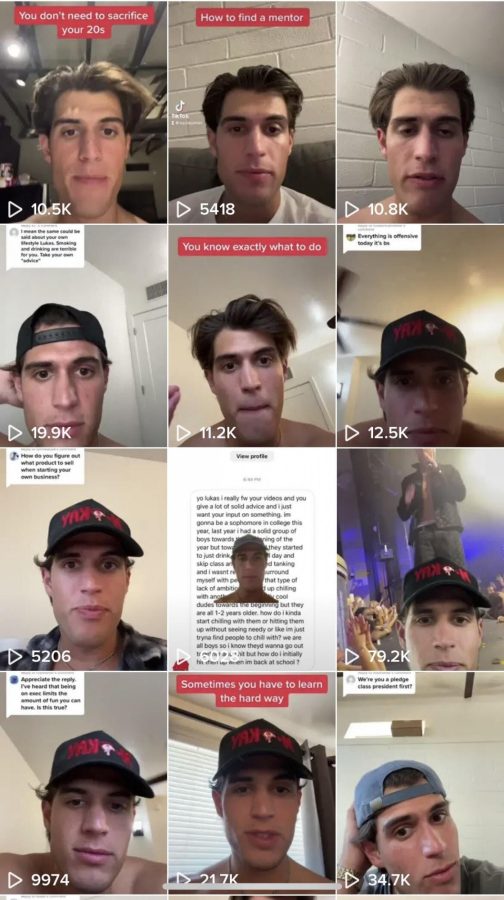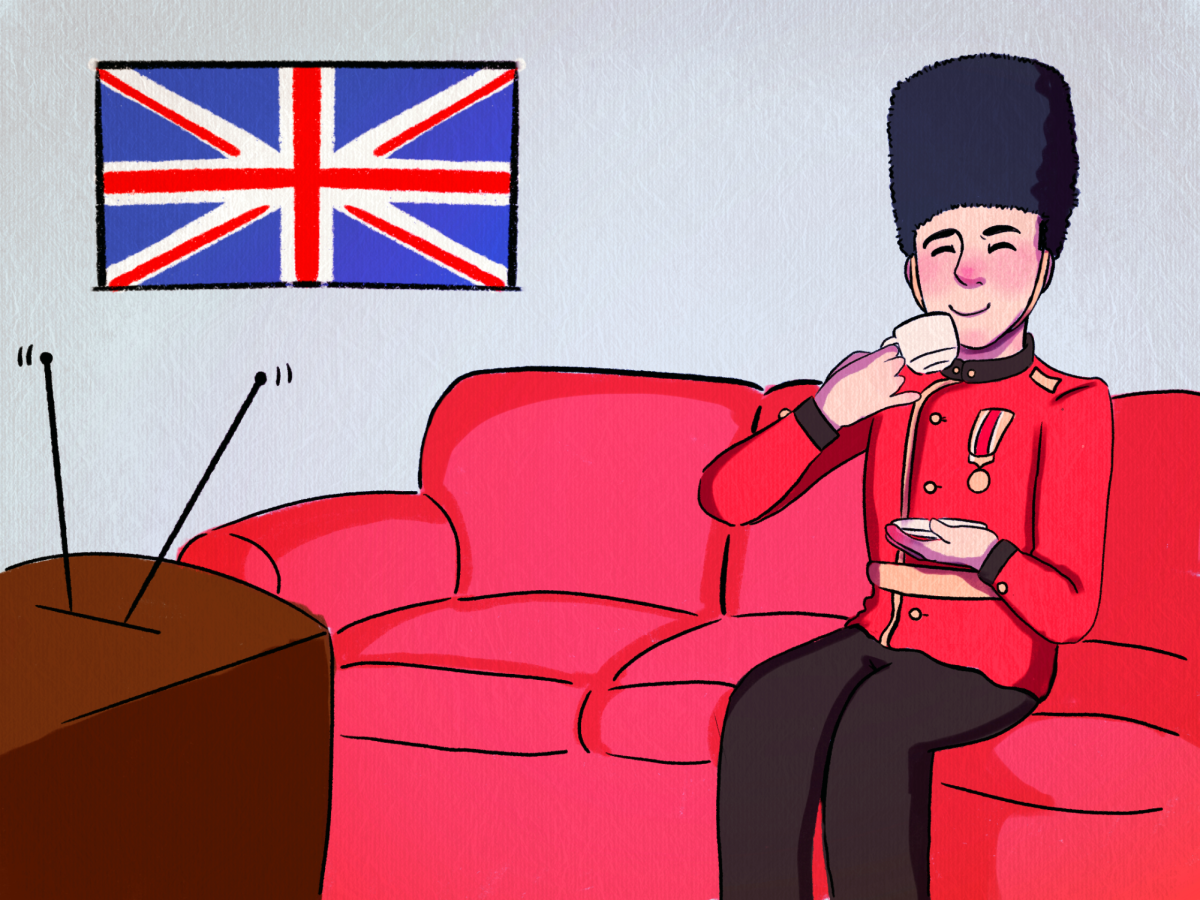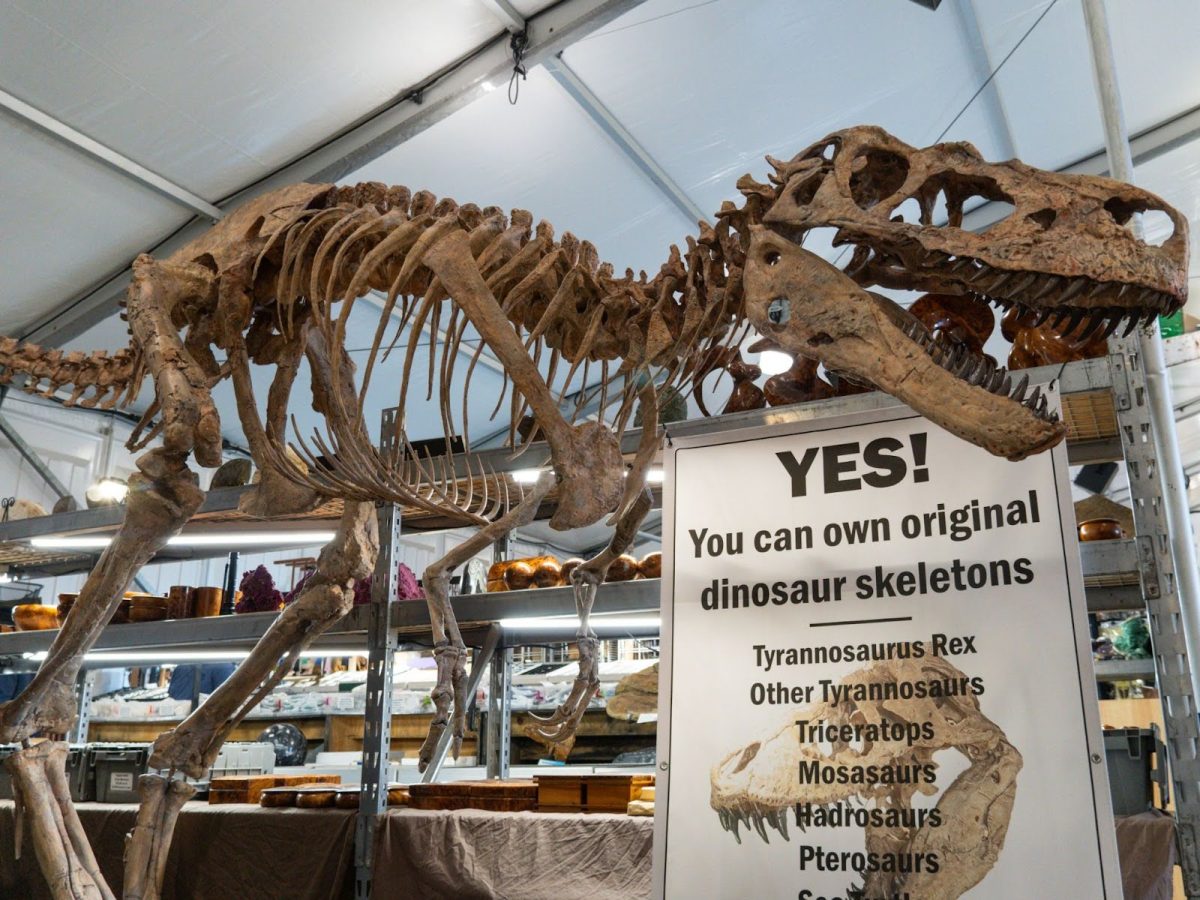A collage of screenshots from Lukas Pakter’s TikTok.
*Editor’s Note: This opinions piece was originally published Sept. 19, 2022, but after a miscorrection in the copy editing process, not due to any fault of reporter Olivia Krupp, the piece was sent through a second round of copy editing before publishing again.
Lukas Pakter, a University of Arizona senior, former Zeta Beta Tau fraternity president and mid-range TikTok star, always knew he’d have a platform someday. Sitting down in Starbucks, he told me everything there is to know about criticism and controversy. Essentially, he told me everything there is to know about him.
“One of my friends said, ‘This is embarrassing dude, what are you doing? This is dumb,’ and I said, ‘Watch, I’ll be at 80k by the time school starts,’” Pakter said. “I hit 87k the day school started.”
Pakter has no issue with confidence. His content, which he distributes each day to more than 100,000 followers, runs the gamut from fitness to motivational speaking. One day he’s dispersing bite-sized lessons he’s learned in college and another day he’s flexing in front of a mirror, espousing the sins of being fat.
“Some people get upset when I say that I don’t really have that much respect for people who are morbidly obese,” Pakter said in a recent video, “and I don’t.”
At first glance, his platform is predictable and contains every stereotype you’ve ever heard about someone like Pakter (or Chad, or Kyle). Still, Pakter described himself to me as both controversial and cocky, which begs the question, what could be so controversial and unique about a fraternity boy being cocky?
In some ways, that depends on who you ask. For one explanation, turn to the comments section on his TikTok page, which often feels more like a shrine to his loyal followers. Many of his comment sections are overflowing with praise that reminds me of giddy fangirls, but most of these comments are not from girls — in fact, almost none of them are.
His comment section is flooded predominantly with young males displaying their undying adoration and support for Pakter in the form of comments like, “Common Lukas W,” calling him a winner. Other common comments include, “This guy pulls hot chicks left and right,” “Bro I wanna be just like you” and “This kid is the man.”
This type of hero worship began when Pakter posted a viral video on how he spent half of his net worth on a gym membership as a broke college student. He described that as the video that got him started.
“I thought maybe I should just post life advice. People really liked that,” Pakter told me.
There’s a similar theme of adoration in Pakter’s Q&A videos, which consist of anonymous direct messages he receives on the app asking for a myriad of advice, from questions about breakups, to how to deal with social anxiety or even what to do when you have substance abuse problems.
These inquiries hardly lack depth or vulnerability. With the commenters’ identities kept anonymous by Pakter, it seems that no subject is off the table.
These messages and comments are easy to dismiss as silly — cringeworthy, even. It seems difficult to understand why these young guys would look up to someone they don’t even know for advice on subjects so personal. Why wouldn’t they just save these questions for their friends or better yet their therapists? Why do they see Pakter as this qualified god of knowledge who knows all?
“It’s very hard for a lot of guys to come out and ask for certain advice,” Pakter said during his interview. “I think we’ve grown up in a time where there’s really not a lot of good role models for men.”
In many ways, Pakter’s right. It is hard for guys to come out and ask for advice, and harder still to find positive role models. Often in the comments of his videos, some of Pakter’s followers have compared him to Andrew Tate, a famous right-wing podcaster, who infamously said that, “women are men’s property.” Similar to Pakter situation, many of Tate’s comments are filled with similar devotion and fondness, many of which come from males — young males. They are also the ones behind the large like counts of TikToks Pakter has posted, describing women in terms of “untouched,” “untapped” and “fresh.” The good role models that Pakter mentions do seem few and far between. It’s unclear whether or not he believes he is one of them.
While Pakter does not compare himself to Tate, in some of his videos, he has addressed the comparisons that some other people have made between him and Tate. He prefaces calmly that what he is about to say is going to piss a lot of people off, but he doesn’t care — it’s his page.
“[Tate] has made a lot of people a lot of money. … Even if it is degrading to these women, he is making these girls hundreds of thousands of dollars off his OnlyFans business,” Pakter said in one of his TikToks from August. “But he does say a lot of stuff that motivates people. Go look at his comments and see what people think of him. It’s a lot of appreciation, and ‘thank you’ and ‘you’ve changed my perspective.’”
Tate does have an OnlyFans business that he runs out of Romania. It could be worth noting that Romanian police raided his home as part of a human-trafficking investigation. It is conceivable that something like that could be seen as degrading to women.
“I’ve got nothing against Tate. Yeah he’s a misogynist, and he’s sexist and stuff and that’s really unfortunate,” Pakter said in another one of his TikToks from July, “but I do respect that he’s really honest in what he says.”
Some comments on the video of Pakter speaking on Tate are in favor of both Pakter and Tate such as, “Andrew Tate is my role model,” “Tate is a win for society” or “Lukas is the blueprint.” It is important to understand what it means for young men to view these types of statements and figures as “the blueprint.” It is also important to understand why so many of these young men are left confessing their problems to less than ideal role models on the internet.
“A lot of guys won’t admit their problems because they don’t wanna come off as having a weakness and so I think by me doing that it shows that everybody is normal,” Pakter told me.
This is true. While a lot of these messages seem cringeworthy or silly, the implications behind them are more sad than anything else. It is undeniable that a lot of young men have a harder time speaking about their problems or reaching out for advice. A survey commissioned by the Mental Health Foundation found that men are statistically less likely to seek professional support or disclose a mental health problem to friends and family.
From this, it can be assumed that a lot of the discussions seen on Pakter’s platform aren’t being had within male friend groups or with a positive mentor, hence the idolization of people like Pakter. While it is difficult to disagree with giving an outlet to talk about various issues young men face, like Pakter does, it is worth noting that some of his points, and the support that follows them, can be troublesome.
“As a man, I think one of your primary roles is to be a protector. There’s a reason why, if the ship is sinking, the men are the last one to get off. I personally think it would be extremely unlike that of a man to say ‘let me get the lifeboat first.’ I think that’s something guys should be proud of,” Pakter said.
During his interview, Pakter described his younger self as a loser and troubled. He said he had no friends and depression and that no one liked him. One could only assume how many of his young viewers share that same reality. Naturally, they don’t want to be a loser. They don’t want to get in the lifeboat first, they want to be “a man.” They see Pakter as not just some guy, but rather an image of who they could be. The social implications behind this are endless: What does it mean to be a man? What does it mean to be an alpha man? The underdog becomes the hero, and the loser becomes the man.
It seems that Pakter feels he has mastered this metamorphosis.
“If you think about any animal kingdom, there are alpha males or alpha females in that group dynamic. If I met someone, I could probably tell within 90 seconds what their personality is. It doesn’t have to do with looks or how tall you are. It’s simply the energy you put out and how you hold yourself,” Pakter said.
Anyone could admire Pakter for letting young men know they should take pride in their masculinity, just as they could admire him for his open vulnerability online. Both are commendable and a platform like his can be progressive. Unfortunately, the idea of being “the man” or the “alpha” is often not the grand finale in the transformation of a “loser.” The obsession with being the hyper-masculine gym bro, the guy who “gets hot chicks left and right,” is nothing but a futile chase and an empty promise for a lot of these young men.
If only their role models were telling them that.
Follow Olivia Krupp on Twitter

Olivia is a freshman who has yet to declare her major. She enjoys reading, foreign films and poetry in her free time.









